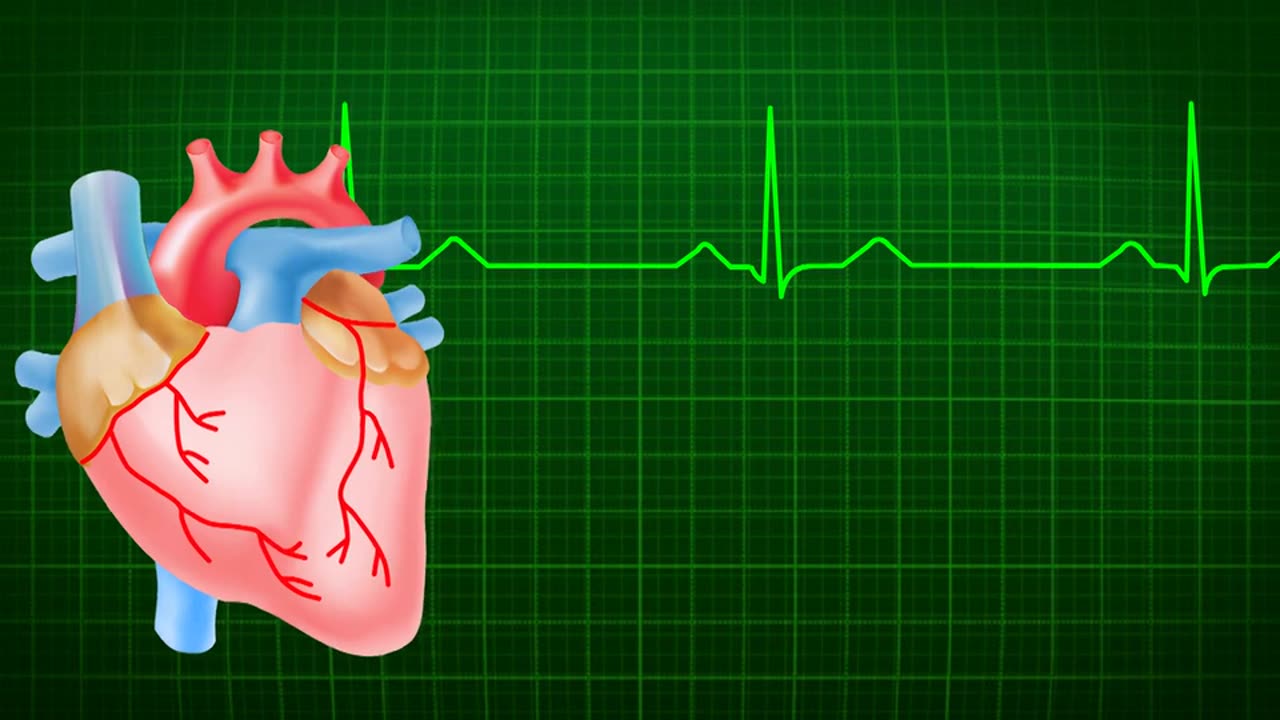Premium Only Content

What is heart block?
Electrical signals control the beating of your heart. They tell your heart muscle when to contract, a process known as conduction. The normal timing of heartbeats is generated in the upper chamber of the heart (atria) in a structure called the sinus node. When you have heart block, there is interference with the electrical signals that usually move from the atria to the ventricles. These signals tell your heart when to beat. This is known as a conduction disorder. If the electrical signals can’t move from your atria to your ventricles, they can’t tell your ventricles to contract and pump blood correctly.
In most cases of heart block, the signals slow down, but do not completely stop. Heart block is categorized as first-, second-, or third-degree:
First-degree heart block is the least severe. The electrical signals slow down as they move from your atria to your ventricles. First-degree heart block might not require treatment of any kind.
Second-degree heart block means that the electrical signals between your atria and ventricles can intermittently fail to conduct. There are 2 types of second-degree heart block
Mobitz type I: The electrical signals get slower and slower between beats. Eventually your heart skips a beat.
Mobitz type II: The electrical signals sometimes get to the ventricles, and sometimes they do not. There is no progressive slowing of the electrical signal. This type of heart block can often progress to third degree heart block.
Third-degree heart block is the most severe. Electrical signals do not go from your atria to your ventricles at all with this type. There is a complete failure of electrical conduction. This can result in no pulse or a very slow pulse if a back up heart rate is present.
What causes heart block?
If you are born with heart block, you have congenital heart block. Either a condition your mother had during her pregnancy, or heart problems you were born with, cause this condition.
For most, heart block develops as you get older as the wires that connect the top and bottom of the heart can develop fibrosis and eventually fail. Sometimes this may happen due to advancing age. Any process which can damage these heart wires can result in heart block.
Coronary artery disease with and without a heart attack is one of the most common causes of heart block. Cardiomyopathies which are diseases that weaken the heart muscle can also result in wire damage. Any disease that can infiltrate the heart such as sarcoidosis and certain cancers or any disease that results in heart inflammation such as certain autoimmune disease or infections can result in heart block. Electrolyte abnormalities especially high potassium levels can also result in wire failure.
Who is at risk for heart block?
If you are born with heart block, you have congenital heart block. Either a condition your mother had during her pregnancy, or heart problems you were born with, cause this condition. Many instances of heart block occur because of some other condition or event such as:
Older age
Heart attack or coronary artery disease
Cardiomyopathy
Sarcoidosis
Lyme disease
High potassium levels
Severe hyperthyroidism
Certain hereditary neuromuscular diseases
Medicines that slow the heart rate
Post open heart surgery
What are the symptoms of heart block?
Symptoms depend on the type of heart block you have:
First-degree heart block may have no bothersome symptoms.
Second-degree heart block might cause:
Dizziness
Fainting
The feeling that your heart skips beats
Chest pain
Trouble breathing or shortness of breath
Nausea
Fatigue
Third-degree heart block, which can be fatal, might cause
Intense tiredness
Irregular heartbeats
Dizziness
Fainting
Cardiac arrest
-
 29:08
29:08
Afshin Rattansi's Going Underground
1 day agoCol. Lawrence Wilkerson: World War 3 is ALREADY HERE, Netanyahu is INTENT on Greater Israel
4.41K15 -
 LIVE
LIVE
SpartakusLIVE
5 hours agoNONSTOP Snipes, Rockets, and BICEPS = Monday MOTIVATION
449 watching -
 LIVE
LIVE
Rallied
6 hours ago $1.96 earnedSolo Challenges All Day
306 watching -
 DVR
DVR
Flyover Conservatives
9 hours agoIs AI Actually Alien Intelligence? Dr. Jason Dean Exposes the Dark Side | FOC Show
10.3K -
 1:47:36
1:47:36
Glenn Greenwald
5 hours agoJD Vance and Rand Paul Clash on Due Process: War on Terror Echoes; Has the U.S. Given Up on Confronting China? Ben Shapiro's Latest Falsehoods About Israel | SYSTEM UPDATE #510
83K65 -
 LIVE
LIVE
RaikenNight
3 hours ago $0.14 earnedExploring the Galaxy of No Mans Sky
130 watching -
 LIVE
LIVE
Spartan
5 hours agoRanked and Expedition 33 (NG+4 and all enemies Set to 10x health)
68 watching -
 LIVE
LIVE
Jokeuhl Gaming and Chat
8 hours agoDARKTIDE - Warhammer 40k w/ Nubes and AoA
87 watching -
 2:19:56
2:19:56
Nerdrotic
15 hours ago $3.03 earnedNerdrotic Nooner 513
40.1K2 -

BigTallRedneck
4 hours agoRANKED FINALS W OMEGA
12.3K